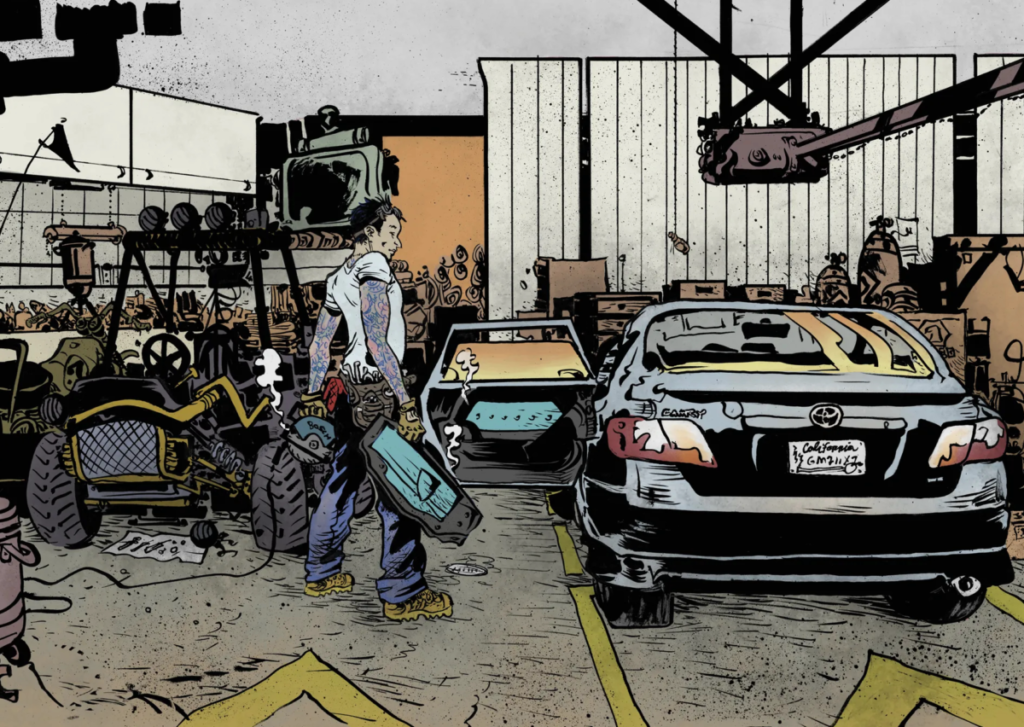
A few weeks ago, after a lengthy writing session, I switched my phone off Work mode and noticed that I had a voicemail from an unknown number with a Los Angeles area code. I’ve been noodling with a couple of long-term projects connected to the city of my birth, so I figured it was a callback about one of those ventures. But the message could not have been more unexpected, nor more welcome:
Hey Brendan, this is Alfred Anaya. I’m just calling to tell you I’m out now. I’m at a halfway house here in Hollywood. I’d like to talk to you, man, if you can. I still haven’t learned how to use this phone, so if you call Aimee, she’ll give you the number. I hope you’re good and your family’s good. Talk to you later.
Those words startled me because Alfred, whose story I first wrote about here on Microkhan and later expanded into a Wired feature, wasn’t due to be released from federal prison for a few more years. I was beyond elated that he’d caught a well-deserved break and was now free. But a piece of me couldn’t help but dwell on how I’d failed him.
When I first started working on Alfred’s story a dozen years ago, I was still sussing out what kind of writer I wanted to be. I knew I was drawn to tales of people swept up in extreme circumstances, but I hadn’t devoted enough thought as to why that was the case—I was too busy pinging from one assignment to the next, constantly worried I’d lose my toehold in the industry if I stopped churning out copy. Once I got enmeshed in piecing together what had happened to Alfred, however, I finally paused to contemplate why tragic stories like his get their hooks into me. My chief takeaway was that I’m wired to be moved by narratives in which someone tries to carve out a new life for themselves, only to find that the quintessentially American act of reinvention can have unforeseen and destructive side effects. And because of the way I’ve always viewed myself, I instinctually empathize with the people who fell short of their lofty goals, especially when they were doomed by rash mistakes.
To tell those upsetting stories in a way that honors the trust that sources place in me, I have to get emotionally invested in the labor—often to a point that it’s impossible to maintain a wall between my professional and personal lives. Once a piece is published, how can I move forward when the characters I wrote about must continue to live through the hardships I chronicled? Alfred’s story was the first time I had to deal with that issue in a heavy way. During my reporting, I found that he’d received terrible legal advice, and that the prosecutor had told at least one major lie during the trial. So when Alfred’s family asked me to help them explore what post-conviction remedies might be available to him, my conscience obliged me to do what I could.
And that’s where I fear I fell woefully short of the mark. I studied up on habeas corpus petitions and the clemency process, and I tried to alert influential people to the depth of Alfred’s plight. But in the end, nothing I contributed had any impact on the length of his sentence. And though I know there’s nothing in my job description about serving as an advocate, I still lament how powerless I was to do anything except spin Alfred’s story into a semi-readable format.
That sort of mournfulness has been my constant companion ever since, as I’ve gotten stuck into numerous harrowing stories that I can never quite expunge from my thoughts. I know I need to reorient the way I approach these projects, but I’m afraid to keep things at arm’s length—a big piece of me can’t envision writing anything worthwhile unless I allow myself to be emotionally drained. There are times, however, when I wonder whether I’ve reached the point where I can no longer bear the psychic cost of being close to so much pain.
The upbeat news is that Alfred and I finally managed to connect, and I was heartened by his positive vibes. He’s still trying to figure out a lot of the technology that has emerged over the past decade—the payment options at Target knocked him for a loop—and he’ll have to cut through a bunch of red tape to make it out of the halfway house. But I got choked up listening to him gush about how much he’s looking forward to hanging out with his first grandchild. I could only respond by promising that whatever he needs, I’m here for him.


Like gas stations in rural Texas after 10 pm, comments are closed.